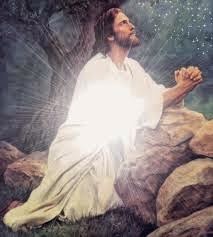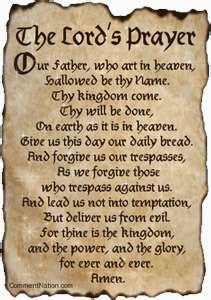Excerpts taken from the
Secrets of the Rosary by St. Louis
de Monfort
The Our Father or the Lord’s Prayer derives its great value
above all from its author, who is neither a man nor an angel, but the King of
angels and of men, our Lord Jesus Christ.
St. Cyprian says it was necessary that he who came to give us the life
of grace as our Saviour should teach us the way to pray as our heavenly
Master.
The beautiful order, the tender
forcefulness and the clarity of this divine prayer pay tribute to our divine
Master’s wisdom. It is a short prayer
but can teach us so very much, and it is well within the grasp of uneducated
people, while scholars find it a continual source of investigation into the
mysteries of God. The Our Father contains
all the duties we owe to God, the acts of all the virtues and the petitions for
all our spiritual and corporal needs.
.jpg) |
| St. Louis de Montfort |
Tertullian says that the Our Father is a summary of the New
Testament. Thomas a Kempis says that it
surpasses all the desires of all the saints; that it is a condensation of all
the beautiful sayings of all the psalms and canticles; that in it we ask God
for everything that we need, that by it we praise him in the very best way; that
by it we lift up our souls from earth to heaven and unite them closely to God.
 |
| St. John Chrysostom |
We should say the Our Father with the certitude that the eternal Father will hear us because it is the prayer of his Son, who he always hears, and because we are his members. God will surely grant our petitions made through the Lord’s Prayer because it is impossible to imagine that such a good Father could refuse a request couched in the language of so worth a Son, reinforced by his merits, and made at his behest.
St. Augustine assures us that whenever we say the Our Father
devoutly our venial sins are forgiven. The
just man falls seven times, and the Lord’s Prayer he will find seven petitions
which will both help him to avoid lapses and protect him from his spiritual
enemies. Our Lord, knowing how weak and
helpless we are, and how many difficulties we endure, made his prayer short and
easy to say, so that is we say it devoutly and often, we can be sure that God
will quickly come to our aid. . .
 |
| St. Augustine |
. . . People who say the Lord’s Prayer carefully, weighing
every word and meditating on them, may indeed call themselves blessed, for they
find therein everything that they need or can wish for. When we say this wonderful prayer, we touch
God’s heart at the very outset by calling him by that sweet name of Father. . .
We have God for our Father, so we are all brothers, and
heaven is our homeland and our heritage.
“Our Father who art in heaven” – Thou who dost fill heaven and
earth with the immensity of thy being.
Thou who art present everywhere: Thou who art in the saints by thy
glory, in the damned by they justice, in the good by thy grace, in sinners by
the patience with which thou dost tolerate them, grant that we may always
remember that we come from thee; grant that we may live as thy true children;
that we may direct our course towards thee alone with all the ardour or our
soul.
“Hallowed be thy name” The name of the Lord is holy and to be feared,
said the prophet-king David, and heaven, according to Isaiah, echoes with the
praises of the seraphim who unceasingly praise the holiness of the Lord, God of
hosts. We ask her that all the world may
learn to know and adore the attributes of our God, who is so great and so
holy. We ask that he may be known, loved
and adored by pagans, Turks, Jews, barbarians and all infidels; that all men
may serve and glorify him by a living faith, a staunch hope, a burning charity,
and by the renouncing of all erroneous beliefs.
In short, we pray that all men may be holy because our God himself is
holy.
“Thy kingdom come” That is to say; May your reign in our souls by your grace, during life, so that after death we may be found worthy to reign with thee in thy kingdom, in perfect and unending bliss; that we firmly believe in this happiness to come; we hope for it and we expect it, because God the Father has promised it in his great goodness, and because it was purchased for us by the merits of God the Son; and it has been made known to us by the light of the Holy Ghost.
“Thy kingdom come” That is to say; May your reign in our souls by your grace, during life, so that after death we may be found worthy to reign with thee in thy kingdom, in perfect and unending bliss; that we firmly believe in this happiness to come; we hope for it and we expect it, because God the Father has promised it in his great goodness, and because it was purchased for us by the merits of God the Son; and it has been made known to us by the light of the Holy Ghost.
.jpg) |
| Thy Will be Done |
“Give us this day our daily bread” Our Lord teaches us to ask God for everything
that we need, whether in the spiritual or the temporal order. By asking for our daily bread, we humbly
admit our own poverty and insufficiency, and pay tribute to our God, knowing
that all temporal goods come from his Providence. When we say bread we ask for that which is necessary
to live; and, of course that does not include luxuries. We ask for this bread today, which means that
we are concerned only for the present, leaving the morrow in the hands of
Providence. And when we ask for our
daily bread, we recognize that need God’s help every day and that we are
entirely dependent upon him for his help and protection.
“Forgive us our trespasses as we forgive those who trespass against us” Every sin, says St. Augustine and Tertullian,
is a debt which we contract with God, and he in his justice requires payment
down to the last farthing. Unfortunately
we all have these sad debts. No matter
how many they may be, we should go to God with all confidence and with true
sorrow for our sins, saying, “Our Father who art in heaven, forgive us our sins
of thought and those of speech, forgive us our sins of commission and of
omission which make us infinitely guilty in the eyes of thy justice. “We dare to ask this because thou art our
loving and merciful Father, and because we have forgiven those who have offended
us out of obedience to you and out of charity.
“Do not permit us, in spite of our infidelity to thy graces, to give in
to the temptations of the world, the devil, and the flesh.
 |
| Temptation of Christ |
“Amen” This word at the
end of the Our Father is very consoling, and St. Jerome says that it is a sort
of seal of approbation that God puts at the end of our petitions to assure us
that he will grant our requests, as though he himself were answering: “Amen,
May it be as you have asked, for truly you have obtained what you asked for.” That is what is meant by this word: Amen.
 We honour
his sublimity and his glory and his majesty by the words Who art in heaven,
that is to say, seated as on thy throne, holding sway over all men by thy
justice. . .
We honour
his sublimity and his glory and his majesty by the words Who art in heaven,
that is to say, seated as on thy throne, holding sway over all men by thy
justice. . .
. . . Each word of the Lord’s Prayer is a tribute we pay to the perfections
of God. We honour his fecundity by the
name of Father. Father, thou who
throughout eternity dost beget a Son who is God like thee, eternal,
consubstantial with thee, who is of the very same essence as thee; and is of
like power and goodness and wisdom as thou art… Father and Son, who, from our
mutual love, produce the Holy Ghost, who is God like unto you; three persons
but one God. Our Father.
 |
| The Holy Trinity |
This means that he is the Father of mankind,
because he has created us and continues to sustain us, and because he has
redeemed us. He is also the merciful
Father of sinners, the Father who is the friend of the just, and the glorious
Father of the blessed in heave. When we
say Who art, we honour by these words the infinity and immensity and fullness
of God’s essence.
God is rightly called “He
who is;” that is to say, he exists of necessity, essentially, and eternally,
because he is the Being of beings and the cause of all beings, and he is in all
of them by his essence, by his presence and by his power, but without being
bounded by their limitations.
 We honour
his sublimity and his glory and his majesty by the words Who art in heaven,
that is to say, seated as on thy throne, holding sway over all men by thy
justice. . .
We honour
his sublimity and his glory and his majesty by the words Who art in heaven,
that is to say, seated as on thy throne, holding sway over all men by thy
justice. . .
. . . It is our duty, therefore, to say it often, with
attention, and the same spirit as he composed it.
Louis de Montfort has must more to say in his book, “The
Secret of the Rosary”, you should get a copy.
.jpg)




No comments:
Post a Comment